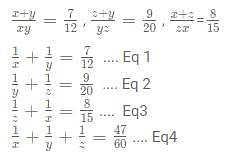CAT Exam > CAT Questions > If (7xy)/(x+y) = 12 , (9yz)/(y+z) = 20, (8zx/...
Start Learning for Free
If (7xy)/(x+y) = 12 , (9yz)/(y+z) = 20, (8zx/z+x) = 15. Then 1/x , 1/y , 1/z are in
- a)Arithmetic Progression
- b)Geometric Progression
- c)Harmonic Progression
- d)They are not in any progression
Correct answer is option 'C'. Can you explain this answer?
Most Upvoted Answer
If (7xy)/(x+y) = 12 , (9yz)/(y+z) = 20, (8zx/z+x) = 15. Then 1/x , 1/y...

Subtracting Eq1, Eq2 and Eq 3 from Eq 4 we get..

They are in HP. Hence B is the correct answer.
Community Answer
If (7xy)/(x+y) = 12 , (9yz)/(y+z) = 20, (8zx/z+x) = 15. Then 1/x , 1/y...

Subtracting Eq1, Eq2 and Eq 3 from Eq 4 we get..

They are in HP. Hence B is the correct answer.

|
Explore Courses for CAT exam
|

|
Similar CAT Doubts
If (7xy)/(x+y) = 12 , (9yz)/(y+z) = 20, (8zx/z+x) = 15. Then 1/x , 1/y , 1/z are ina)Arithmetic Progressionb)Geometric Progressionc)Harmonic Progressiond)They are not in any progressionCorrect answer is option 'C'. Can you explain this answer?
Question Description
If (7xy)/(x+y) = 12 , (9yz)/(y+z) = 20, (8zx/z+x) = 15. Then 1/x , 1/y , 1/z are ina)Arithmetic Progressionb)Geometric Progressionc)Harmonic Progressiond)They are not in any progressionCorrect answer is option 'C'. Can you explain this answer? for CAT 2025 is part of CAT preparation. The Question and answers have been prepared according to the CAT exam syllabus. Information about If (7xy)/(x+y) = 12 , (9yz)/(y+z) = 20, (8zx/z+x) = 15. Then 1/x , 1/y , 1/z are ina)Arithmetic Progressionb)Geometric Progressionc)Harmonic Progressiond)They are not in any progressionCorrect answer is option 'C'. Can you explain this answer? covers all topics & solutions for CAT 2025 Exam. Find important definitions, questions, meanings, examples, exercises and tests below for If (7xy)/(x+y) = 12 , (9yz)/(y+z) = 20, (8zx/z+x) = 15. Then 1/x , 1/y , 1/z are ina)Arithmetic Progressionb)Geometric Progressionc)Harmonic Progressiond)They are not in any progressionCorrect answer is option 'C'. Can you explain this answer?.
If (7xy)/(x+y) = 12 , (9yz)/(y+z) = 20, (8zx/z+x) = 15. Then 1/x , 1/y , 1/z are ina)Arithmetic Progressionb)Geometric Progressionc)Harmonic Progressiond)They are not in any progressionCorrect answer is option 'C'. Can you explain this answer? for CAT 2025 is part of CAT preparation. The Question and answers have been prepared according to the CAT exam syllabus. Information about If (7xy)/(x+y) = 12 , (9yz)/(y+z) = 20, (8zx/z+x) = 15. Then 1/x , 1/y , 1/z are ina)Arithmetic Progressionb)Geometric Progressionc)Harmonic Progressiond)They are not in any progressionCorrect answer is option 'C'. Can you explain this answer? covers all topics & solutions for CAT 2025 Exam. Find important definitions, questions, meanings, examples, exercises and tests below for If (7xy)/(x+y) = 12 , (9yz)/(y+z) = 20, (8zx/z+x) = 15. Then 1/x , 1/y , 1/z are ina)Arithmetic Progressionb)Geometric Progressionc)Harmonic Progressiond)They are not in any progressionCorrect answer is option 'C'. Can you explain this answer?.
Solutions for If (7xy)/(x+y) = 12 , (9yz)/(y+z) = 20, (8zx/z+x) = 15. Then 1/x , 1/y , 1/z are ina)Arithmetic Progressionb)Geometric Progressionc)Harmonic Progressiond)They are not in any progressionCorrect answer is option 'C'. Can you explain this answer? in English & in Hindi are available as part of our courses for CAT.
Download more important topics, notes, lectures and mock test series for CAT Exam by signing up for free.
Here you can find the meaning of If (7xy)/(x+y) = 12 , (9yz)/(y+z) = 20, (8zx/z+x) = 15. Then 1/x , 1/y , 1/z are ina)Arithmetic Progressionb)Geometric Progressionc)Harmonic Progressiond)They are not in any progressionCorrect answer is option 'C'. Can you explain this answer? defined & explained in the simplest way possible. Besides giving the explanation of
If (7xy)/(x+y) = 12 , (9yz)/(y+z) = 20, (8zx/z+x) = 15. Then 1/x , 1/y , 1/z are ina)Arithmetic Progressionb)Geometric Progressionc)Harmonic Progressiond)They are not in any progressionCorrect answer is option 'C'. Can you explain this answer?, a detailed solution for If (7xy)/(x+y) = 12 , (9yz)/(y+z) = 20, (8zx/z+x) = 15. Then 1/x , 1/y , 1/z are ina)Arithmetic Progressionb)Geometric Progressionc)Harmonic Progressiond)They are not in any progressionCorrect answer is option 'C'. Can you explain this answer? has been provided alongside types of If (7xy)/(x+y) = 12 , (9yz)/(y+z) = 20, (8zx/z+x) = 15. Then 1/x , 1/y , 1/z are ina)Arithmetic Progressionb)Geometric Progressionc)Harmonic Progressiond)They are not in any progressionCorrect answer is option 'C'. Can you explain this answer? theory, EduRev gives you an
ample number of questions to practice If (7xy)/(x+y) = 12 , (9yz)/(y+z) = 20, (8zx/z+x) = 15. Then 1/x , 1/y , 1/z are ina)Arithmetic Progressionb)Geometric Progressionc)Harmonic Progressiond)They are not in any progressionCorrect answer is option 'C'. Can you explain this answer? tests, examples and also practice CAT tests.

|
Explore Courses for CAT exam
|

|
Signup for Free!
Signup to see your scores go up within 7 days! Learn & Practice with 1000+ FREE Notes, Videos & Tests.


























